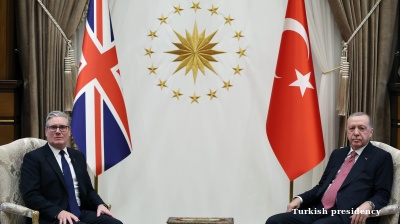Markets this week turned the financial screw on Turkey as, dismayed by the country’s election results, investors resigned themselves to at least another five years of President Recep Tayyip Erdogan and what they see as his economic mismanagement.
To seal the deal that will take him into a third decade as Turkey’s leader, Erdogan must still win the presidential run-off against opposition unity candidate Kemal Kilicdaroglu on May 28, but there is little faith that the challenger will find the extra votes to turn around the 49%-to-45% defeat he suffered, to much surprise, in the first-round vote.
The Turkish lira (TRY) fell to its latest record low on May 19, trading in the 19.80s. That brought its losses versus USD since polling day to around 1%. The currency lost 44% in 2021 and 30% in 2022 as Erdogan kept up his unorthodox monetary policy of slashing interest rates despite rampant inflation. In the past 15 years under Erdogan, the lira has shed 95% of its value versus the dollar.
Might a post-election Erdogan return to conventional interest rate management? On May 18 he told CNN in an interview: “Please do follow me in the aftermath of the elections, and you will see that inflation will be going down along with interest rates.”. Asked whether that meant there would be no change in economic policy, he replied: “Yes. Absolutely.”
Erdogan also told the broadcaster: “I have a thesis that interest rates and inflation, they are directly correlated. The lower the interest rates, the lower the inflation will be.
“In this country, the inflation rate will come down along with the interest rates, so that we will come to a point where people will be relieved. I say this speaking as an economist. This is not an illusion.”
Erdogan may change policy once safely back in the palace, but few already wrong-footed investors in the rattled markets are taking any chances.
With some analysts warning Turkey faces another currency crisis under a re-elected Erdogan, with the country’s external current account deficit having ballooned to around 6% of GDP, market observers also noted how credit default swaps (CDS), which measure the cost of insuring a country’s debt against default, ended the week on 684 bp compared with around 480 bp before the election, according to data from S&P Global Market Intelligence.
At 661 bp over US Treasury yields, Turkey is now paying a higher premium than similarly-rated countries such as Honduras, Iraq and Mongolia, which have traded at or near distressed levels in recent months, according to a Bloomberg index tracking emerging market debt.
Three straight days of losses saw many of Turkey’s longer-dated dollar bond issues on May 18 (May 19 was a public holiday in Turkey) down more than 10 cents in the dollar below the close at the end of last week, with some trading below the 70-cent mark that analysts broadly consider the threshold for distressed territory, Reuters reported.
The main Borsa Istanbul banking stocks index, meanwhile, shed a further 3.64% on May 18, taking it to a level 20.7% lower than its pre-election close, while the stock exchange’s overall equities index closed 3.43% lower on the day.
Latest central bank data showed Turkey’s net international reserves sank by $4.45bn to a more than 21-year low of $2.33bn in the week to May 12 as demand for FX from local buyers looking to protect their savings leapt ahead of the elections. In the six weeks leading up to the elections, the reserves plunged by $17bn as the Erdogan administration sought to prop up the economy.
The net forex reserves are in deeply negative territory once outstanding swaps, which totalled $36.86bn on May 17, are subtracted. Turkey’s gold reserves have declined around $9bn to $44.3bn since the end of March as the central bank sold reserves to meet domestic demand after gold imports were restricted following the February earthquake catastrophe when retail investor demand started driving up the current account deficit.
“There’s a growing demand for dollars and gold in the market,” Enver Erkan, chief economist at Istanbul-based brokerage Dinamik Yatırım Menkul Degerler, was reported as saying by the Financial Times, adding: “The central bank is doing whatever it can, but that’s not a sustainable approach, because there’s not much left in the tank, in terms of reserves.”
Looking at the lira, Piotr Matys, senior FX analyst at In Touch Capital Markets, advised: "Should Erdogan be re-elected, the lira may be allowed to trade far more freely after being supported by backdoor FX interventions [prior to the elections], which are not sustainable over the mid-term horizon.
"Unless the CBRT [Central Bank of the Republic of Turkey] raises interest rates significantly, the lira may drop precipitously if backdoor FX interventions stop or are reduced markedly."
On the same theme, Jon Harrison, managing director of emerging market macro strategy at TS Lombard, told Reuters: "The authorities will intensify efforts to stablise the lira through intervention and measures to encourage banks to hold lira, but without a change in policy direction by Erdogan the situation looks unsustainable, meaning the currency will weaken further."
In comments emailed to Bloomberg on the prospect of Erdogan continuing in power, Cem Karacadag, head of emerging markets sovereign debt at Barings, said: “It’s bad news for investors, as it implies a heightened probability of the continuation of bad structural and macro policies.”
“All the nominal variables are wrong – interest rates, exchange rate, and prices – so savings and investment decisions become short-sighted, if not impossible,” Karacadag also said, adding that the current situation was “not a tenable investment thesis for investors.”
Battling to keep something of a grip on the lira and address FX shortages ahead of the upcoming presidential run-off vote, the central bank brought in regulations that caused Turkish banks to restrict access to some individual loans and postpone decisions on extending corporate loans. Some banks raised monthly mortgage loan rates above 3% and car loan rates reached 4%, bankers told Reuters.
Consumers also found that credit card cash advances, seen as the cheapest, most common borrowing option for individuals before the elections, were no longer available.
"Financial institutions, which are uncertain about economic policies and costs after the election, are trying to avoid granting loans, if possible, within the 15-day period following the first round of voting," Seref Fayat, chairman of the Clothing and Apparel Industry Assembly, told Reuters."As a result, the difficulty in securing loans is increasing day by day, hour by hour."
Features

Project Matador marks new South Korea-US nuclear collaboration
Fermi America, a private energy developer in the United States, is moving ahead with what could become one of the most significant privately financed clean energy projects globally.

CEE needs a new growth model as FDI plunges
wiiw economist Richard Grieveson says the CEE region’s long-standing model of attracting FDI through low labour costs no longer works.
KSE: Ukraine is facing a $53bn budget shortfall, but economy is stable for now
Ukraine is in urgent need of additional financing from partners as the continuation of the war drives up defence spending and reconstruction needs, jeopardizes budget financing, weighs on the balance of payments, and slows economic growth.

PANNIER: Ruling family’s ‘palace in the sky’ cruel sight for Turkmenistan’s poor souls down below
Photos posted of renovated Boeing by US makeover manager offer further insight into "ultra-luxurious" world enjoyed by Berdimuhamedovs.




